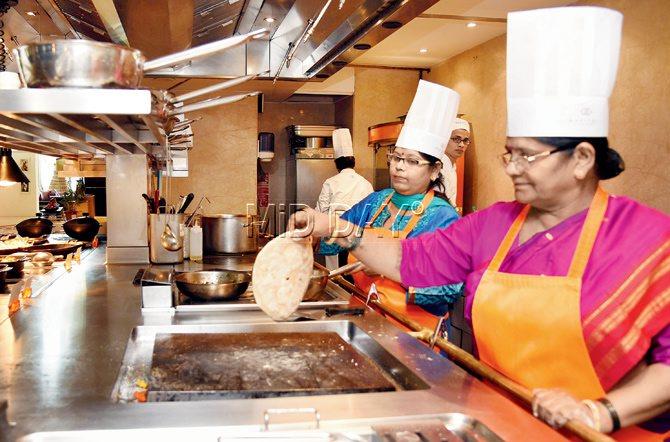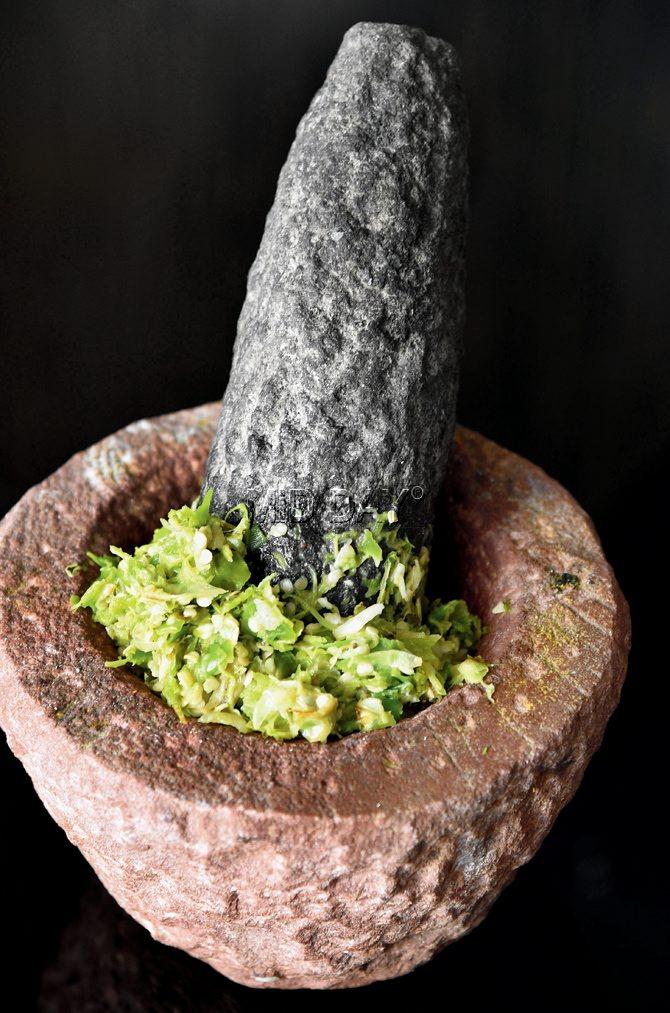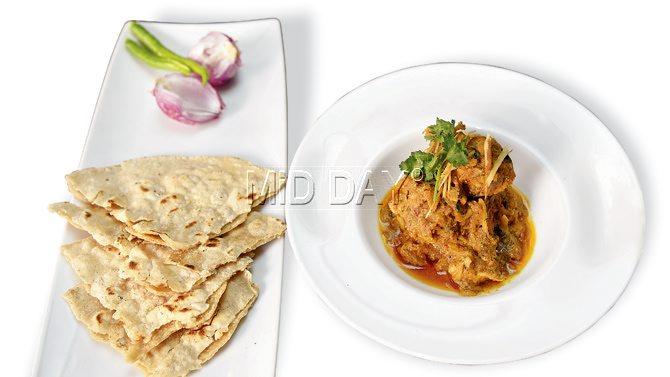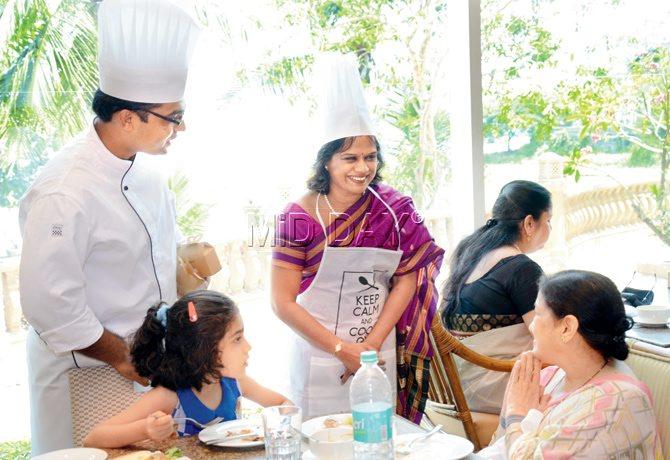Draped in a pink shade of magenta, that matches her bindi, chef Sugandha Polke greets us at the Bandra Kurla Complex Sofitel hotel. For the next eight days, the mother and daughter will be in charge of the three-year restaurant’s 240-square-foot kitchen. Their brief? To offer diners a spread of authentic Maratha Warrior fare. Along the lines of what they make at home

Sugandha Polke, 62, and her daughter, 40, were invited to create the menu for Pondicherry Caf�������©���¢��������s ongoing Great Maratha Warrior Food Festival. This is the first time the Vashi residents cooked commercially.
ADVERTISEMENT
Draped in a pink shade of magenta, that matches her bindi, chef Sugandha Polke greets us at the Bandra Kurla Complex Sofitel hotel. An aching knee has left the 62-year-old with a slight limp, but her eyes shine behind her gold-rimmed spectacles. Her hands in a namaste, she takes seat on a sofa at the Pondicherry Café, on the hotel’s ground floor. Her 40-year-old daughter Varsha, sits next to her, patting her in affection.

Sugandha Polke, 62, and her daughter, 40, were invited to create the menu for Pondicherry Café’s ongoing Great Maratha Warrior Food Festival. This is the first time the Vashi residents cooked commercially. Pics/Sameer Markande
For the next eight days, the mother and daughter will be in charge of the three-year restaurant’s 240-square-foot kitchen. Their brief? To offer diners a spread of authentic Maratha Warrior fare. Along the lines of what they make at home.
Vashi residents Sugandha and Varsha are home chefs, and this is their first venture outside their home kitchen into a commercial enterprise. The restaurant’s chef de cuisine, Milind Dhonsekar, says the hotel’s general manager, Biswajit Chakraborty learnt about the duo through a common acquaintance. “Thus, when we decided to hold the Maratha Warrior food festival, he suggested that we invite her,” says Dhonsekar.

Sugandha Polke prefers to use a mortar pestel to mash chillies instead of using an electronic blender
Maratha Warrior cuisine is categorised as the food eaten by Maharastrian farmers 300 years ago. The farmers, from the Mawala community, formed the army headed by Shivaji in 1670s. The food is characterised by its lightness — think the opposite of the rich Mughlai food. Think bhakri roti made of jowar and bajra, lassoon garlic, kanda onion, thecha powdered garlic chutney. The Maratha kingdom was spread over coastal Malvan and ghati plateau regions and covered Sangli, Pune, Kolhapur and Solapur from where Sugandha hails.
Home to the hotel
Sugandha and her daughter, however, aren’t the first home cooks to don the chef’s hat in a five-star kitchen. They are not even the first to do so at Sofitel. “Last year, we’d invited a home chef to curate a Malvani food festival last year,” says Dhonsekar. What the mother-daughter duo represent is the increasing comfort that hotels seem to have to home chefs, because “it is a great way to offer authentic traditional fare to guests”. “When it comes to simple, homecooked fare, we can’t beat home chefs. It gives us an opportunity to learn, and gives them a wider outreach,” he says, admitting that getting Sugandha to agree to be a part of the festival was a task in itself.

Try the bharli vaangi and mutton ukad prepared by Sugandha
“Bada kaam hai khaana banana. Hotel mein banana risky hota hai,” Sugandha admits. While she can speak in Hindi, she is more comfortable in Marathi. Once in a while when we are unable to decipher some words, Varsha steps in.
Sugandha’s journey in the kitchen began at the age of 12, under the tutelage of her mother. The next year she got married. “My mother-in-law was very particular about food, and I have taken several scoldings to master our cusine,” says Sugandha, who has not yet shared the family recipe of ghati masala — a mix of jaiphal nutmeg, jaivitri mace, lavang clove, tej patta bay leaf, haldi, turmeric, methi fenugreek and jeera cumin — that is used to spice up the dishes, with anyone. Not even Varsha. “It will be passed on to us only when she is on her deathbed. While we know the ingredients, the process remains a secret. She makes it when we are not at home,” laughs Varsha, who is a school teacher at a BMC school and on leave for this as the project needs them to present from 9 am-1 pm and 3 pm-9 pm.

In May, Powai-s Renaissance Mumbai Convention Centre Hotel invited 12 home chefs from Secret Indian Recipe, a blog for home chefs across India, for their Sunday brunch. Home chefs, restaurants say, offer a peek into traditional fare
Without revealing any secrets, however, Sugandha has managed to get help from Varsha to create a menu for that boasts of bharli khari vangi, suke chicken, mutton ukad, bombil chutney, basundi and puran poli. Dhonsekar says the restaurant’s chefs first had a tasting session with the duo, which was followed by a briefing after which the two were taken through the workings of their kitchen. “Most home chefs are used to cooking for a maximum of 10 people. Our staff helps them out with quantity planning, sourcing ingredients and cooking,” he adds.
Reservoir of recipes
In May, Sandeep Pande, executive chef, at Renaissance Mumbai Convention Centre Hotel, invited 12 home chefs from Secret Indian Recipe, a blog for home chefs. “None of them had any professional training. Yet, each of them created a lavish spread for our Sunday brunches. The idea is to offer guests a taste of quaint recipes, which give a hint of a home-cooked meal,” says Pande, who brought his own signature to the dishes. “We had matkecha usal, which is usually served in a bowl. To this, we added a crispy khichya papad, chilli oil, chopped onion and dried chutney. In the end, it looked like a laksa or a khowsuey.”
Some times, the homechefs leave behind more than a happy memory. Pande incorporated a Bengali kofta recipe provided by one on his menu. “The meaty dumplings were made of Kalia fish, and the gravy was high on mustard. Today, it has become our best-seller. On the other hand, we took inspiration from a coconut, jaggery and cardamom modak, and turned it into an Indian pancake. Home chefs are a treasure trove of micro cuisines that date back generations. This is how we can peep into their tattered diaries with semi torn pages,” he adds.
Opportunity on a platter
The relationship is symbiotic. Where the hotel gets a new cuisine in its repertoire, the home chef gets the stage to showcase his/her skills. Money can either come in a lumpsum, or a profit-sharing module, which could range from anything between Rs 5000 to 20,000.
Last October, food blogger and consultant Saee Koranne-Khandekar curated a coastal Koknastha and central Maharastrian Deshastha thali festival at Four Point Vashi Sheraton. Khandekar, who ran the show for a fortnight, created the menu, trained kitchen staff for three days, and even shared recipes. “Bharli vaangi and ratalyache kaap are my specialty. I supervised the staff through all the dishes,” she smiles. The festival, Khandekar adds, has been a boon. “I bagged another consultancy project and received inquiries for teaching and menu curating.”
But, can a restaurant bring them on permanently? Delhi-based chef Ritu Dalmia has her reservations. Always on the look out for home chefs for her Diva restaurants, Dalmiya says, “The only problem with home chefs is that there is no longetivity in their commitment. If their maid bunks, they will not meet the orders either. Thus, this trend of inviting them for pop-ups and festivals is ideal.”
 Subscribe today by clicking the link and stay updated with the latest news!" Click here!
Subscribe today by clicking the link and stay updated with the latest news!" Click here!







